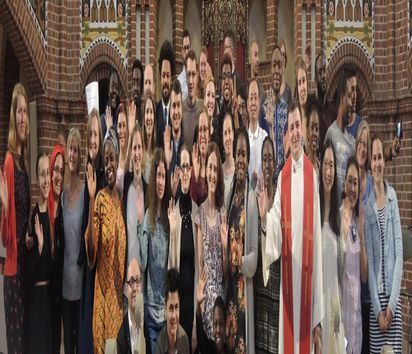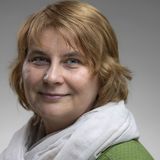
Interchurch scholarships
We provide exchange, research and university scholarships to students worldwide who are committed to the goal of ecumenism. During the scholarship, we provide extensive mentoring and financial support.
Brot für die Welt, in cooperation with the German National Committee of the Lutheran World Federation (DNK/LWF), supports people from churches, theological institutions, charitable organisations, diaconia and interfaces between church and society which are open or committed to the principle of ecumenism. We award academic exchange, research and university scholarships in Germany and abroad. Doctoral scholarships can also be awarded in Germany (see: leadership programme). Since 1952, we have provided scholarships to help employees of our partner churches obtain qualifications and specialisations in ecumenical, theological and charitable fields. These scholarships help to promote ecumenism, strengthen interdenominational dialogue and encourage networking between churches and academic institutions.
Scholarships for international students in Germany
Students and young academics from the East or Global South in the field of theology and other church-related subjects (e.g. religious education, charitable work, church music, faith-based social work) as well as church employees who would like to obtain qualifications, specialise or conduct research in Germany. Applicants must belong to:
- Protestant and Orthodox member churches of the World Council of Churches (Brot für die Welt) Denominations: Reformed, United, Anglican, Methodist, Baptist, Orthodox, Oriental Orthodox, etc. or
- Member churches of the Lutheran World Federation (German National Committee of the Lutheran World Federation) Denomination: Lutheran
-
Full scholarships
-
Study accompanying programme
-
Personal and academic support during the scholarship
-
Alumns programme after completion of the scholarship
- Must belong to a member church of the World Council of Churces (WCC) or the Lutheran World Federation (LWF) abroad and be recommended by its leadership. Theologians need the recommendation of their church leadership; students of other church-related subjects need the recommendation of their congregation in their country of origin.
- Must have been in Germany for no more than 15 months at the time studies commence
- German language skills (B1 level at the time of application, B2 level at the start of studies) and/or the language of study at the level required by the degree programme
- Minimum requirement: passed intermediate examination, bachelor’s degree or equivalent.
- Maximum age generally 35 years
The application deadlines are 1 January and 1 July; a scholarship committee decides on the awarding of scholarships. Expect a processing time of several months.
Scholarships for international students from LWF member churches for ecumenical specialisation abroad
Students and young academics in the field of theology and subjects relevant to religious instruction, as well as church employees from member churches of the Lutheran World Federation outside Germany (German National Committee of the Lutheran World Federation) who require an ecumenical specialisation. Denomination: Lutheran
Programmes:
- “Ecumenical Semester” in Sibiu, Romania (focus: Orthodoxy and Protestant minority churches in Eastern Europe)
- “Ecumenical Year” at the Centro Melantone in Rome, Italy (focus: Catholicism and Protestant minority churches in Italy)
-
Full scholarships
-
Study accompanying programme
-
Personal and academic support during the scholarship
-
Alumns programme after completion of the scholarship
- Must belong to a member church of the Lutheran World Federation (DNK/LWF) abroad and be recommended by its leadership
- Must be admitted to the ecumenical degree programme in Rome or Sibiu
- The specific language and formal admission requirements of the respective degree programmes apply.
- Minimum requirement: passed intermediate examination, bachelor’s degree or equivalent.
- Maximum age generally 35 years
Scholarships for German students of theology and church-related subjects abroad
Students and young academics in the field of theology and subjects relevant to religious instruction:
- United regional churches and the Reformed Church in Germany (Brot für die Welt) Denominations: Reformed, United.
- Lutheran regional churches in Germany (German National Committee of the Lutheran World Federation) Denomination: Lutheran
Possible with and without programme commitment
Partner programmes:
- “Studies in the Middle East” in Beirut, Lebanon
- “Interreligious Studies in Japan” in Kyoto, Japan
- “Studies in Israel” in Jerusalem, Israel
- “Ecumenical Semester” in Sibiu, Romania
- “Ecumenical Year” at the Centro Melantone in Rome, Italy
-
Partial scholarships
-
Support within the framework of the respective study programmes
-
Alumns programme after completion of the scholarship
- Must belong to a German regional church and be recommended by its leadership (usually the ecumenical or training unit, or the religious studies counselling department). Students from united regional churches and reformed churches apply to Brot für die Welt; students from Lutheran regional churches apply to the German National Committee of the Lutheran World Federation.
- The specific language and formal admission requirements of the respective international universities and departments apply; for the ecumenical studies programmes, the applicant must be admitted to the programme.
- Minimum requirement: Intermediate examination (for theologians), bachelor’s degree for students of other subjects relevant to religious instruction.
The application deadlines are 1 January and 1 July; a scholarship committee decides on the awarding of scholarships. Expect a processing time of several months.
General application requirements
- Academic qualification: must have completed at least intermediate examination in theology/bachelor’s degree or equivalent
- Knowledge of the language in the country of study
- Recommendation from the church leadership (for theologians) or the parish office
- Two academic letters of reference
- Maximum age generally 35 years


